
English (965)
Children categories
Netherlands support for Institute OF Educational Development of BRAC University

24 March 2009, Dhaka. The Embassy of the Kingdom of the Netherlands (EKN) and BRAC signed an agreement on March 23 under which the Netherlands Development Cooperation programme will provide support to the Institute for Educational Development (IED) at BRAC University. The Netherlands contribution will be 50.4 crore takas (approximately Euro 5 million) over five years.
The agreement was signed by the Netherlands Ambassador, Ms. Bea ten Tusscher, and by Mr. Fazle H. Abed, Chairperson of BRAC, at a simple ceremony at the Westin hotel.
Under the terms of this agreement, IED will use the Dutch support to implement the Educational Research, Training and Advocacy Program (ERTAP) whose objective is to improve quality, equity and efficiency in the education system. ERTAP targets primary and secondary education through interlinked activities: design and testing of teaching, training and learning materials; degree and diploma courses and policy dialogue. The goal is to complement and support government efforts through partnership and collaboration. In her remarks, the Dutch Ambassador acknowledged the remarkable progress of Bangladesh in expanding primary education. She recognized the complementary role of NGO's in achieving universal primary education and emphasized the strategic importance of effective partnering between IED and the Ministry of Education. The Dutch Ambassador also expressed her appreciation for the joint efforts of Government and NGOs to substantially improve the quality of teaching and learning and to reach the excluded, hard-to-reach school-age children. In his remarks the BRAC Chairperson emphasized the importance of the collaboration between IED and the national systems to improve human resources in the education sector in Bangladesh.
The Director of IED Ms. Erum Mariam also conveyed a speech during the ceremony.
BRAC Endorsing the Campaign for Client Protection in Microfinance
15 April 2009, Dhaka. BRAC is endorsing the Campaign for Client Protection in Microfinance which is launching Spring 2009. The Center for Financial Inclusion is serving as interim host for the Campaign for Client Protection, a collaborative initiative endorsed and led by leaders in the microfinance industry.
The Campaign for Client Protection in Microfinance - Launching Spring 2009
The Campaign for Client Protection in Microfinance seeks to unite microfinance providers worldwide to develop and implement standards for the appropriate treatment of low-income clients based on the six principles. The overall objective of the Campaign is for these principles to become embedded within the fabric of the microfinance community and for microfinance to be recognized as a strongly pro-consumer industry.
Beyond fostering adherence to these common principles, the Campaign will develop a toolkit to help microfinance institutions incorporate the principles into their operations. It will also work towards certification standards that set apart those institutions which have fully implemented pro-consumer practices. The size of the mission is enormous, and collaboration is essential to the Campaign's success.
The objectives of the Campaign are to:
º Unite the microfinance industry around a clear statement of the core principles of client protection;
º Gain the commitment of MFIs and their staff to operate under these principles, demonstrated through a Microbanker`s Oath, in the spirit of the Hippocratic Oath;
º Establish a tool kit, based on research findings from the Beyond Codes action research project, to assist in the implementation of the principles into all aspects of institutional operations, including a self-assessment protocol and an institutional action plan;
º Create a website community to unite financial service providers, microfinance professionals and supporting organizations (investors, microfinance associations, network organizations, etc.) and provide for an ongoing dialogue with colleagues as they implement the tool kit;
º Work with the microfinance industry to create independent programs for institutional certification.
Integrating good client protection practices into MFI operations worldwide is a large undertaking; it requires the involvement of all facets of the industry. The Campaign for Client Protection offers all microfinance industry stakeholders the opportunity to join in this work as we seek the answers together. Together we can discover how best to advance this agenda and integrate good consumer protection practices more fully into all institutions that work in microfinance.
As an initial goal, the Campaign has committed to engaging at least half of the world's 500 largest microfinance institutions (MFIs) reporting to the MIX Market within the next three years. The MIX 500 largest MFIs serve an estimated 65 million poor borrowers worldwide, 70 percent of them women. Ultimately, the Campaign envisions that thousands of people working in the microfinance industry will also personally sign the Banker's Oath via the campaign website.
Visit of Norwegian State Secretary: views BRAC Sidr rehabilitation work
20 April 2009, Dhaka. BRAC is pleased to announce that Norway's State Secretary for International Development, Hakon A. Gulbandsen, undertook a field trip to Patharghata, Barguna, on Sunday, April 19 2009, to observe BRAC's Sidr rehabilitation work. He was accompanied by the Norwegian Ambassador and BRAC's Executive Director.

The State Secretary saw BRAC's implementation of activities on improved housing for the homeless people. He spoke to victims about their Sidr experience and learnt how they were gradually resuming normal lives. He conveyed his condolences to families that had lost close relatives in the cyclone. He saw how a Pond Sand Filter is providing safe drinking water to over 1000 people and expressed satisfaction with the benefits that the filter was offering to the community. He inspected an under-construction multi-purpose cyclone shelter that is being built on a "killa" to secure livestock during cyclones.

The State Secretary talked to the local people about climate change and how they perceived its impacts. He was impressed by the BRAC demonstration projects on agriculture and the ways in which BRAC was preparing communities to adapt to climate change. He appreciated the substantive role women play in rural development and their gradual entry into the work force.
The State Secretary met with Chairperson Fazle Hasan Abed today (20.04.09) at BRAC headquarters during which they discussed health and education outreach activities for reaching the MDGs, how Bangladesh could be role model for adaptive climate change efforts and the critical importance of gender equality.
WORLD MALARIA DAY 2009 Celebration
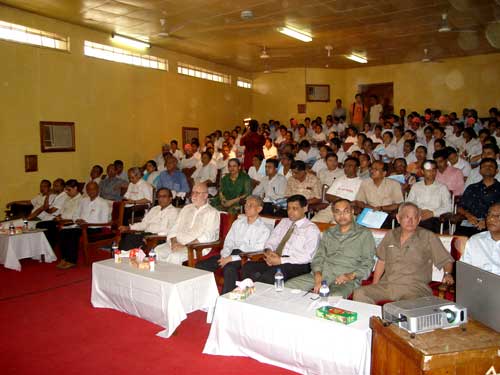
26 April 2009, Dhaka. World malaria day was celebrated nationwide on April 25, 2009 for the second time. This year the main key message of malaria day was “Counting malaria out.” Nationwide different programs were organized in 13 malaria prone districts for celebrating the day.
Centrally the main program was held at Rangamati. The Chairman of Regional Council of Chittagong Hill Tracts, Shree Jyotrindro Bodhiprio Larma, was the chief guest. The program was chaired by Mr. Jogotjyoti Chakma, the Chairman, of Rangamati Hill Tract District Council along with the presence of Mr. Sheikh Altaf Ali, Secretary, Ministry of Health and Family Welfare, as a special guest. High officials of other government and non- government organizations (BRAC, WHO, etc) were also present there. The day started with a rally from Rangamati General Hospital to the Tribal Cultural Institute. Later a day long discussion session, drama and folk songs on public awareness were held at the Tribal Cultural Institute. Lastly there were health camps and field visits on malaria control program activities. Besides, a press briefing was held on April 24, at 10 am, at the conference room of Rangamati Hill Tract District Council.
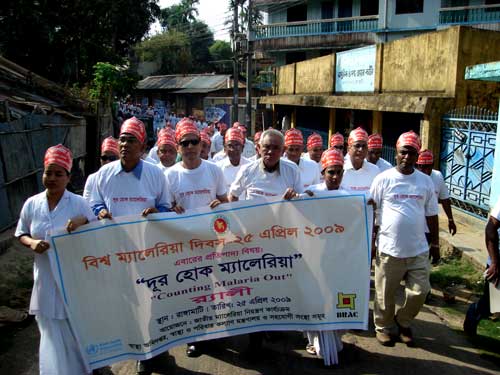
In addition, malaria day was also celebrated at Khagrachari, Bandarban, Cox’s Bazar, Moulovibazar and Sunamganj districts. The main initiatives of celebrating malaria day were taken by the NGOs concerned with Malaria Control Program in sadar upazilas of these districts, under the supervision of Civil Surgeons of respective districts. The day started with the rally which ended up with day long seminar, drama and folk songs on public awareness – same as the central level. Likewise, NGOs working at malaria prone areas also celebrated the day in respective upazilas under the supervision of Upazila Health and Family Planning Officers.
Inaugural of Executive Certificate course in Public Health Management

03 May 2009, Dhaka. An Inaugural Ceremony Executive Certificate course in Public Health Management was held at BRAC Centre on May 2, 2009 from 5-6.30pm that was attended by Professor Dr. Syed Modasser Ali, Advisor on Health to the Prime Minister, as the Chief Guest,
In his speech Professor Dr. Syed Modasser Ali, summarized some of the outstanding successes as well as the challenges faced by Bangladesh in enhancing and institutionalizing good management in health services. He also reiterated the need of a sustainable quality management in health system with optimum utilization of available limited resources, technical, financial and human.
Prof. Jamilur Reza Chowdhury Vice Chancellor, BRAC University welcomed all at the session. Mr Mahboob Hossain Executive Director BRAC Chaired the inaugural ceremony. Prof. Anwar Islam, Director gave an overview of the course.
His Excellency Honorable Mr Justin Lee, High Commissioner, Australian High Commission, Dhaka, attended as the special guest and in his brief speech emphasized the need for supporting capacity building and health services development.
The James P. Grant School of Public Health, BRAC University in collaboration with AusAid is offering the Executive Certificate in Public Health Management tailored for participants from the public Sector health professionals working at upazilla level. It is a seven week course starting from 3rd May till June 18th, 2009.
The overarching goal of the course is to provide health professionals with the knowledge, tools and skills essential for effective and efficient management.
Under the overall leadership of Dr. Anwar Islam, Professor and Director, James P. Grant School of Public Health, the course brings together highly trained teachers/experts from the NIPSOM, NIPORT, BRAC and other institutes of higher learning.
BRAC Tea Estate Recieves Prime Minister's National Award for Afforestation-2008
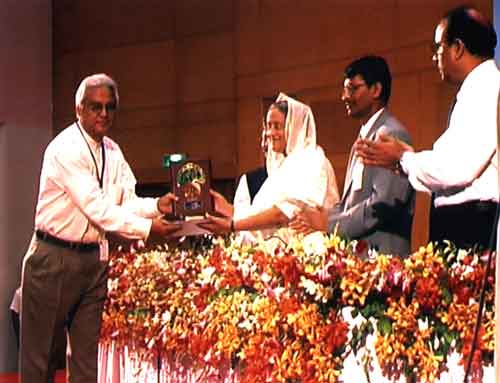
03 June 2009, Dhaka. BRAC’s Kaiyachreea Dalu Tea Estate, Bhujpur, Fatikchari, Chittagong won the First Prize for the Prime Minister’s National Award for Afforestation-2008 for the Agar (Aquilaria) Plantation Project. Mr. Saieed Bakth Mozumder, Director of BRAC Tea Estates Division, received the award from Honorable Prime Minister on 31st May 2009, at the Bangladesh-China Friendship Conference Centre, Dhaka.
Ugandan Vice President Arrives in Dhaka Today to Visit BRAC Programmes
07 May 2009, Dhaka. Ugandan Vice President Professor Gilbert Bukenya arrives in Dhaka today morning (7.05.09) on a six-day visit to view various BRAC programmes. He is scheduled to visit Savar, Manikganj and Gazipur to observe different programmes of BRAC.
Professor Bukenya will be paying a field visit to Dhamrai in Dhaka on Sunday (10.05.09) to explore BRAC's different programmes. During this unique field visit, the Professor will observe the Social and Financial Empowerment of Adolescents (SOFIA) project of the BRAC Micro Finance Programme (MF), a Human Rights and Legal Education (HRLE) class in session, the Water, Sanitation and Hygiene (WASH) Programme, and a Non-Formal Primary School. Later, the Ugandan Vice President will visit Manikganj to observe Sanitary Napkin Production Centre, the Ayesha Abed Foundation and the BRAC Adolescent Development Programme (ADP).
On Monday (11.05.09), Professor Bukenya will travel to Sreepur in Gazipur to a BRAC branch office, to witness the Remittance project there. Then, he will go on to observe the Microfinance Programme's Village Organisation (VO) meeting as well as the VO members' diverse income generating activities. Next, the Vice President will visit the Health Programme's Community Health Forum, the TB Control Programme and the Anti Natal Care Clinic.
Upon his return to Dhaka, on the same day, Professor Bukenya will observe the BRAC Soil Testing Laboratory, the Poultry, Disease and Diagnostic Laboratory, Dairy and Food project, the Agricultural Research and Development Centre including a host of other organised BRAC programmes in Gazipur. In the evening, Professor Gilbert Bukenya will attend a meeting with BRAC's Founder and Chairperson Fazle Hasan Abed.
The Ugandan Vice President will also pay a courtesy call upon the honourable President of the People's Republic of Bangladesh Zillur Rahman and will visit the International Centre for Diarrhea Diseases Research Bangladesh (ICDDR,B) in Mohakhali. During this visit he will be accompanied by Mr. H. E. Madhvani the Ugandan High Commissioner to Dhaka (based in Delhi) and from BRAC, the Executive Director, Dr. Mahabub Hossain, the Executive Director of International Programmes Md. Aminul Alam, and Deputy Executive Director Dr. Imran Matin.
BRAC began operations in Uganda in 2006 and has quickly grown to become one of the largest micro credit providers in the country. BRAC also has integrated programmes in health, education, agriculture and livestock, adolescent development, capacity building, training, and research.
Ugandan Vice President observes BRAC Programmes in Manikganj
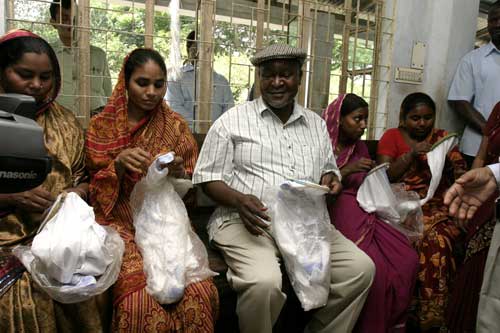
10 May 2009, Dhaka. Ugandan Vice President Professor Gilbert Bukenya visited various BRAC programmes in Manikganj today (10.05.09). During the visit, Professor Bukenya told local journalist that Bangladesh is a fantastic country. He said that the country has changed vastly in just a few years due to organisations like BRAC.
Gilbert Bukenya traveled from Dhaka early morning to Noyadingi in Manikganj to observe BRAC's Sanitary Napkin Production Centre. He explored the different sections of the handmade napkin factory and spoke to the workers. He also met with a BRAC health volunteer (shashthya shebika) and enquired about her daily work. Later he visited the Ayesha Abed Foundation sub-centre in Sadarpur, Manikganj. Professor Bukenya was impressed by watching almost hundred poor women doing embroidery together.
On his way to the BRAC regional office he stopped at a handloom weaving centre in Gorpara, Manikganj where he viewed handloom weaving and embroidery.
At the regional office, the Ugandan Vice President spoke to local journalists and stated that he visited Bangladesh on a previous occasion while he was a student. He said that the country has changed greatly since then. Professor Bukenya also stated that he will try to replicate BRAC's employment generation enterprises in his country to eradicate poverty. Later he visited the Ayesha Abed Foundation handicraft production and training centre and a milk chilling centre in Dorogram, Manikganj. He also met BRAC microfinance borrowers with livestock enterprises in the same village.
The Ugandan Vice President was accompanied by Mr. H.E. Madhvani, the Ugandan High Commissioner to Dhaka (based in Delhi), and from BRAC, the Executive Director of International Programmes Md. Aminul Alam and Deputy Executive Director Dr. Imran Matin.
The Ugandan Vice President arrived in Dhaka last Thursday for a six-day visit. BRAC began operations in Uganda in 2006 and has quickly grown to become on the largest micro credit providers in the country. BRAC also has integrated programmes in health, education, agriculture and livestock, adolescent development, capacity building, training and research.
BRAC holding the Third Technical Advisory Committee Meeting for Manoshi
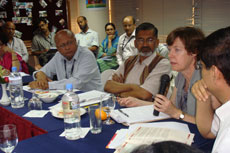
07 April 2009, Dhaka. The third Technical Advisory Committee meeting of Manoshi was held in BRAC Center, Dhaka, Bangladesh during April 5-6, 2009. Manoshi, a five year community-based maternal, neonatal and child health interventions funded by Bill & Melinda Gates Foundations is being implemented by BRAC to reach 8 million populations in urban slums of Bangladesh to reduce maternal, neonatal and child mortality. In order to maintain the highest level of quality, the Technical Advisory Committee comprising renowned national and international public health professionals, scientists, academics and health care professionals meet each year to provide guidance to the project for further improvement. In addition to field visits in urban slums of Dhaka City, in the meeting, the progress of the project was reviewed. The participants suggested models for packaging services in urban slums and discussed how to make this project sustainable. During discussion, many research issues were identified that captured successes, challenges and gaps of Manoshi project. The meeting was also attended by Mr. Fazle Hasan Abed, the Chairperson and Dr. Mahabub Hossain, the Executive Director of BRAC.
BRAC’s work with acid survivors recognised
16 May 2009, Dhaka. BRAC received an award at the International Conference of Acid Survivors held at the Engineers Institution auditorium in Dhaka on May 13, for its work with victims of acid throwing in Bangladesh. Acid Survivors Foundation (ASF) Bangladesh organised the international conference bringing together 600 people -- who were acid survivors, or their relatives or people working for organisations that help acid attack survivors.
Victims of acid attacks are generally women, and they suffer severe burns and life-long pain and disfigurement.
BRAC takes a holistic approach in helping victims of acid attacks, providing them access to medical and psychological treatment as well as access to legal services for them to bring the assailants to justice.
Join the world’s biggest family




